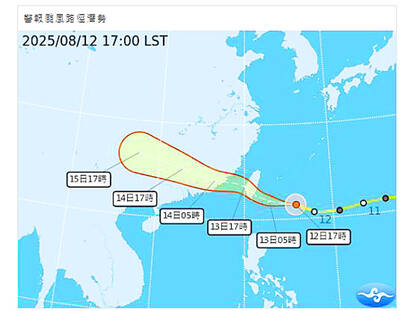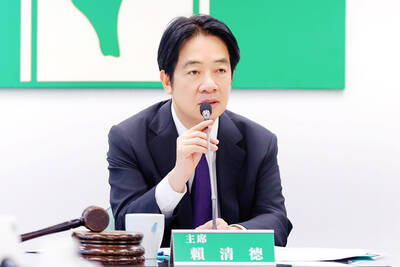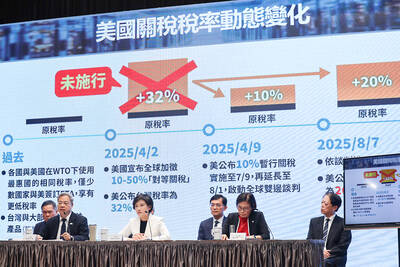The National Security Bureau (NSB) yesterday said it did not have enough equipment to protect the Presidential Office against a nuclear, biological or chemical attack.
To make up for the shortcoming, the bureau said it had sent personnel to train at the Atomic Energy Council (AEC) to increase its ability to protect the president, NSB Deputy Director--General Lin Hui-yang (林惠陽) told the legislature.
The acknowledgment came after local media reported that the bureau lacked equipment and strategies to protect the president against multiple disasters, such as the ones faced by Japan after the March 11 earthquake, tsunami and nuclear crisis.
Meanwhile, a legislator asked whether the military would activate radiation detection devices aboard Lafayette and Kidd-class warships in the wake of local media reports of a possible leakage of radioactive material from the Jinshan Nuclear Power Plant in Shihmen District (石門), New Taipei City (新北市).
Minister of National Defense Kao Hua-chu (高華柱), who also attended the legislative session, said the ministry had switched on the devices on March 12.
The vessels have been monitoring northeastern coastal areas of Taiwan since Tuesday last week, Kao said.
So far, all the data collected by the ministry have been within AEC standards, he said.
Meanwhile, Kao also confirmed that the army’s Chemical Corps would likely be cut as part of the government’s plan to streamline military personnel.
Media reports yesterday revealed that as many as 20 percent of Taiwan’s more than 2,000 chemical specialists could be laid off or reassigned as the ministry moves to close three support groups in the coming years.
The military plans to trim total military personnel to 215,000 from the current 275,000 as it moves toward an all-volunteer force and phases out one-year conscription, a recent report from the Control Yuan showed.
“It isn’t possible to spare every single type of military personnel from the streamlining plan,” Kao said. “It’s [more important] that reserves be quickly called up in times of need.”
“The cutbacks will be comprehensive,” he said.
The concerns about the cutback to chemical specialists were raised after the key role they played in screening inbound passengers from Japan for possible traces of radioactive contamination.
On Thursday, the military conducted radioactive response exercises modeled on a scenario whereby radioactivity or nuclear fallout were detected in Taiwan’s atmosphere.
A report in the Chinese--language Liberty Times (the Taipei Times’ sister newspaper) said the army’s Chemical Corps currently maintain three bases, each with a support group in northern, central and southern Taiwan.
The support groups, which were created after the SARS outbreak in 2003, would be the first to be cut under the plan, the Liberty Times reported.

GET TO SAFETY: Authorities were scrambling to evacuate nearly 700 people in Hualien County to prepare for overflow from a natural dam formed by a previous typhoon Typhoon Podul yesterday intensified and accelerated as it neared Taiwan, with the impact expected to be felt overnight, the Central Weather Administration (CWA) said, while the Directorate-General of Personnel Administration announced that schools and government offices in most areas of southern and eastern Taiwan would be closed today. The affected regions are Tainan, Kaohsiung and Chiayi City, and Yunlin, Chiayi, Pingtung, Hualien and Taitung counties, as well as the outlying Penghu County. As of 10pm last night, the storm was about 370km east-southeast of Taitung County, moving west-northwest at 27kph, CWA data showed. With a radius of 120km, Podul is carrying maximum sustained

Tropical Storm Podul strengthened into a typhoon at 8pm yesterday, the Central Weather Administration (CWA) said, with a sea warning to be issued late last night or early this morning. As of 8pm, the typhoon was 1,020km east of Oluanpi (鵝鑾鼻), Taiwan’s southernmost tip, moving west at 23kph. The storm carried maximum sustained winds of 119kph and gusts reaching 155kph, the CWA said. Based on the tropical storm’s trajectory, a land warning could be issued any time from midday today, it added. CWA forecaster Chang Chun-yao (張竣堯) said Podul is a fast-moving storm that is forecast to bring its heaviest rainfall and strongest

President William Lai (賴清德) yesterday criticized the nuclear energy referendum scheduled for Saturday next week, saying that holding the plebiscite before the government can conduct safety evaluations is a denial of the public’s right to make informed decisions. Lai, who is also the chairman of the Democratic Progressive Party (DPP), made the comments at the party’s Central Standing Committee meeting at its headquarters in Taipei. ‘NO’ “I will go to the ballot box on Saturday next week to cast a ‘no’ vote, as we all should do,” he said as he called on the public to reject the proposition to reactivate the decommissioned

TALKS CONTINUE: Although an agreement has not been reached with Washington, lowering the tariff from 32 percent to 20 percent is still progress, the vice premier said Taiwan would strive for a better US tariff rate in negotiations, with the goal being not just lowering the current 20-percent tariff rate, but also securing an exemption from tariff stacking, Vice Premier Cheng Li-chiun (鄭麗君) said yesterday. Cheng made the remarks at a news conference at the Executive Yuan explaining the new US tariffs and the government’s plans for supporting affected industries. US President Donald Trump on July 31 announced a new tariff rate of 20 percent on Taiwan’s exports to the US starting on Thursday last week, and the Office of Trade Negotiations on Friday confirmed that it